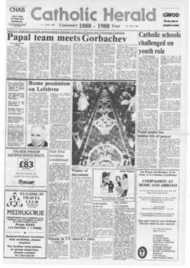Page 6, 10th June 1988
Page 6

Report an error
Noticed an error on this page?If you've noticed an error in this article please click here to report it.
Tags
Share
Related articles
Peter Stanford Talks To Ian Wilson About The Turin Shroud
Shroud In Translation
Chad Varaii, Founder Of The Samaritans : The True Wilderness
A Scintillating Look By Levin At The Sixties
Still Shrouded In Mystery
Moses the scribe, or imposter
Investigative writer Ian Wilson casts a careful eye through the evidence in Who Wrote the Bible? by Richard Elliot Friedman (Jonathan Cape, £12.95) FOR ANY Christian readership this book might have been more accurately entitled Who Wrote the Old Testament?, even though this would almost inevitably have limited the potential market of interest. Sadly, the Old Testament is out of fashion these days, and all too often the scholarly criticism of its texts written in language of almost impenetrable obscurity.
But although Richard Friedman, as Professor of Hebrew and Comparative Religion at Muir College, University of California, has all the authority of a full-blown scholar, no layman need have any qualms about embarking upon the pages of Who Wrote the Bible?. Not only does Friedman bring a refreshing verve and clarity to the business of retracing the origin and development of Biblical texts, he makes it as exciting as any detective story.
Who Wrote the Bible? is not for anyone who wants to know
who Moses was, when he lived, and whether anyone of that name really did lead the children of Israel out of Egypt. Nor does Friedman concern himself with the arguably substantial period when the content of the first Biblical books were passed down orally from generation to generation. His themes, consistent with his book's title, concentrate on the questions of who originally committed the stories to writing. What was the earliest form they took, and how and when they came to be edited in the form we now know them.
Inevitably some of what Friedman has to say is not particularly new. Although tradition has long ascribed to Moses the authorship of Genesis to Deuteronomy (and Catholics once risked the direst penalties for suggesting anything else), during the last two centuries scholars have increasingly recognised that this could not be so. The repeated duplicating of stories (so-called "doublets"), the different names for God within these, and many other clues, show that there were originally two separate, though closely related written traditions of the Creation, the Flood, and so on, which someone quite crudely stitched together many centuries after the death of any original Moses (but also several centuries before the birth of Jesus of Nazareth).
Friedman follows an orthodox line in identifying the strands by their now universally recognised labels J and E, and attributing their authorship to the time when Israel and Judah were a divided kingdom — after the period of David and Solomon, and before the Assyrian invasion of 722 BC. He goes on very convincingly to show how and why the stitching together seems to have taken place in the age of King Hezekiah.
Where he becomes more novel and original is in his deductions on how Deuteronomy and the next six Jewish Bible books, Joshua, Judges, 1 & 2 Samuel, and 1 & 2 Kings — came to be in the form we now have them. These he argues to have been assembled and edited from earlier texts at the hands of one priestly historian, working in the days of king Josiah, a major author-redactor whom he believes to have been either the prophet Jeremiah, or perhaps the scribe Baruch, son of Neriyyah, workirig in some form of collaboration with Jeremiah.
This same author had to revise his work in the wake of Josiah's death and the Babylonian exile. A fascinating photograph in Friedman's book (indeed, it is the only one), is of a clay stamp in late seventh/early sixth century Hebrew script bearing the inscription "Belonging to Baruch son of Neriyyah the scribe." According to Friedman, this is the first archaeological discovery ever of an object identifiable as having belonged to someone mentioned in the Bible, and is of even greater interest because of Baruch's possible substantial hand in the Bible's compilation.
Friedman includes further fascinating discussion concerning the Tabernacle and the P document source within the Pentateuch. Refuting much earlier scholarship, he argues that P must originally have been written before the destruction of the First Temple, but then, along with all the rest of the material, was re-edited by another, now Aaronid priestly scribe who
worked at a time when the Jews had returned from exile and were looking forward to rebuilding their country and their place and mode of worship.
This final redactor, the man who effectively master-minded the major part of the Old Testament material into something close to its presentday shape, Friedman identifies as Ezra.
Having long accepted that Moses did not write the Pentateuch, one cannot help the feeling that it is almost a little too neat actually to be able to put such major names to alternative contributors to the Bible. But Friedman's arguments are both clear and compelling, and it well needs someone with at least equivalent gifts of communication to prove him
wrong. Ian Wilson
The reviewer is author of many investigative books including Jesus The Evidence and two pioneering works on the Turin Shroud.
blog comments powered by Disqus











